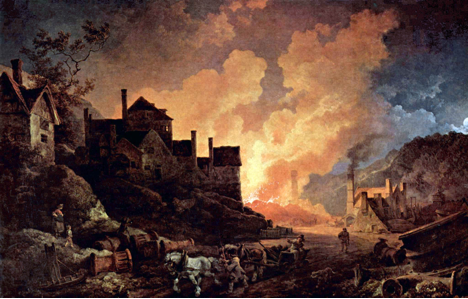Friday
 An inadvertent William Blake reference recently got New York Times conservative columnist David Brooks in trouble with the far right. No one identified the source, however, which is too bad because it’s fairly applicable to Brooks’s point. Here’s what happened.
An inadvertent William Blake reference recently got New York Times conservative columnist David Brooks in trouble with the far right. No one identified the source, however, which is too bad because it’s fairly applicable to Brooks’s point. Here’s what happened.
Brooks and Mother Jones Washington editor David Corn were discussing the news of the week with PBS anchorwoman Judy Woodruff. At one point the conversation took an unexpected turn:
Woodruff: You’re hearing a lot of back and forth between Rubio and Cruz, between Rubio and Christie. So, what’s going on over there, or is anybody making any headway among that group?
Brooks: Yes, Ted Cruz is making headway.
There’s — you begin to see little signs of liftoff. Trump has sort of ceiling-ed out. Carson is collapsing. And Cruz is somehow beginning to get some momentum from Iowa and elsewhere. And so people are either mimicking him, which Rubio is doing a little by adopting some of the dark and satanic tones that Cruz has, and so…
Woodruff: What did you — let me just ask, what did you just say?
If you know your Romantic literature—or for that matter, if you’ve ever been a school child in England who has sung England’s unofficial national anthem—you undoubtedly know that Brooks was quoting from “Jerusalem”:
And did those feet in ancient time
Walk upon England’s mountains green?
And was the holy Lamb of God
On England’s pleasant pastures seen?
And did the Countenance Divine
Shine forth upon our clouded hills?
And was Jerusalem builded here
Among these dark Satanic Mills?
Bring me my Bow of burning gold:
Bring me my arrows of desire:
Bring me my Spear: O clouds unfold!
Bring me my Chariot of fire!
I will not cease from Mental Fight,
Nor shall my sword sleep in my hand:
Till we have built Jerusalem,
In England’s green & pleasant Land.
Neither Woodruff nor Corn picked up on the poetic reference, however, and so were startled. Corn nevertheless found a connection, noting that Cruz’s father, an evangelical pastor, regularly informs his congregation that Satan is guiding the actions of liberals:
Corn: Well, actually, if you go to a speech from his dad, who is a pastor, evangelical, Rafael Cruz, it actually is satanic.
(Laughter)
Corn: He — I watched a speech in which he said Satan was behind the Supreme Court decision to legalize gay marriage.
So, it’s not…
Brooks: OK. Well, I withdraw the satanic from Ted Cruz.
Corn: You’re thinking that it’s political, but, sometimes, it’s literal.
Brooks: Mephistophelian, maybe.
“Mephisophelian” is a pretty good description of Cruz–not as heavily weighted as “Satanic” and capturing his debating agility. The rightwing media, however, reacted to “Satanic” as one would expect: “PBS: Ted Cruz and His Father Are ‘Satanic,’” blared the National Review, and others followed suit.
Without mentioning Blake, Brooks tried to explain himself.
But it’s dark and combative, and, frankly, harsh. It’s a harsh — he gets some jokes in the beginning, but then it’s just, we have enemies. We’re in an apocalyptic situation. We’re on the edge of the abyss. You need a tough guy to beat that back.
And that’s his personality. That’s not Marco Rubio’s personality. He’s a sunny — he’s been running the youthful optimism campaign, but he’s beginning, to prevent Cruz from getting liftoff, to mimic sort of that, get a piece of that.
The ideas are ones that Brooks went on to voice in his most recent column:
Evangelicals and other conservatives have had their best influence on American politics when they have proceeded in a spirit of personalism — when they have answered hostility with service and emphasized the infinite dignity of each person. They have won elections as happy and hopeful warriors. Ted Cruz’s brutal, fear-driven, apocalypse-based approach is the antithesis of that.
While some would dispute Brooks’s belief that Rubio’s “youthful optimism campaign” is preventing Cruz from getting liftoff, I can see why the erudite columnist would channel Blake as he tried to get his point across. If Cruz’s language is apocalyptic, so is the poet’s. The question is whether the upcoming apocalypse will be positive or negative.
Rubio, as Brooks sees him, is Blake’s happy warrior, a positive force who wants to take America back to pre-polarized America (“build Jerusalem in England’s green and pleasant land”). Doing so means fighting, with bow of burning gold, against the “dark Satanic mills” that are taking over the Republican party. (These mills for Blake were not only coal-burning factories but also Oxford and Cambridge, whose narrow, pedantic instruction stood in the way of true enlightenment.) Brooks is worried that the darkness of Cruz and Trump will overwhelm the man that he sees as the GOP’s best chance.
In other words, it makes perfect sense that Brooks, thinking of Rubio as “green and pleasant,” would surface “dark and Satanic” to capture the contrast with Cruz. Without the poetic context, however, the word “Satanic” does indeed sound out of place.

One Trackback
[…] Last week I wrote about another Reformicon, David Brooks of The New York Times, turning to William Blake to express his abhorrence of Cruz. For Douthat, Sarah Palin, who has just endorsed Donald Trump, is Daisy Buchanan. […]